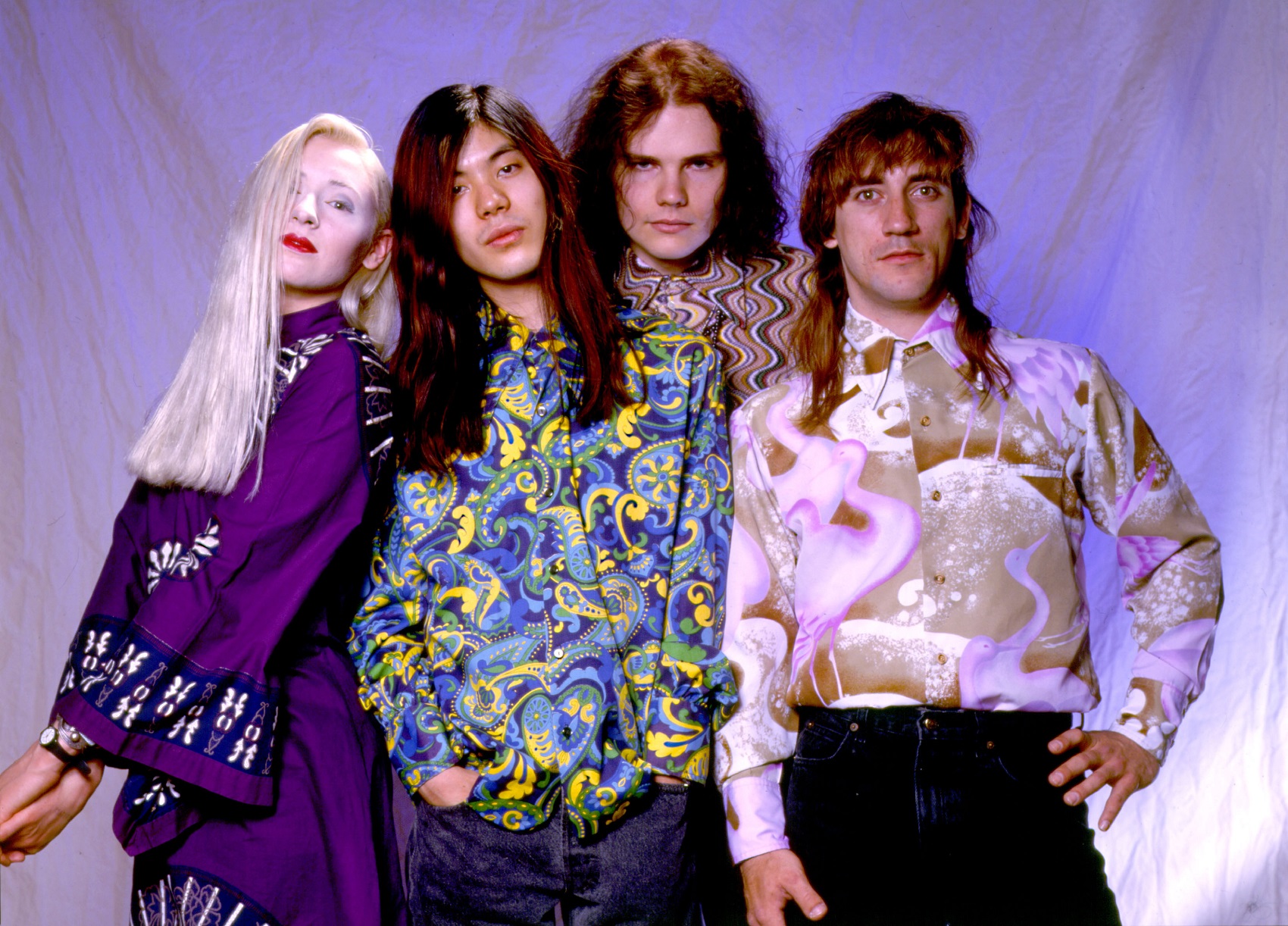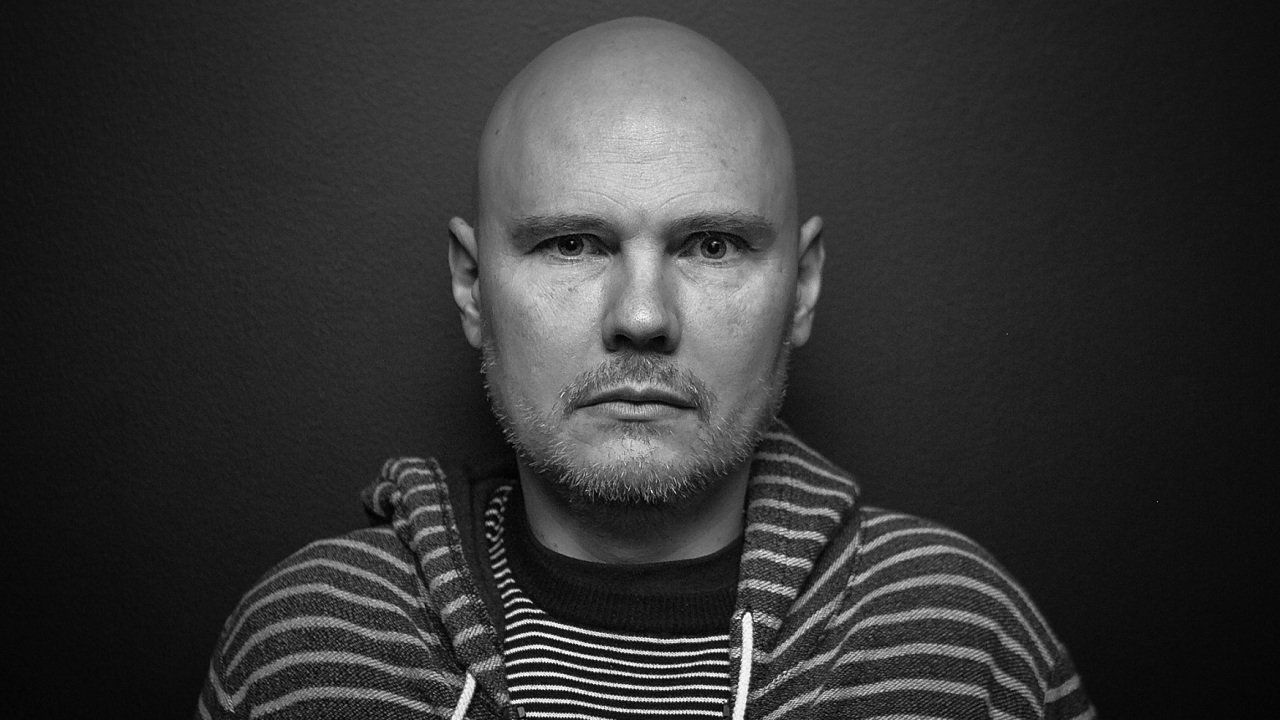William Patrick Corgan is the founding and indeed last remaining original member of Smashing Pumpkins.
Formed in Chicago, Illinois in 1987, the band’s first three albums (Gish, Siamese Dream and the sprawling Mellon Collie and the Infinite Sadness) supplied a soundtrack to the lives of a generation of alienated youth.
Since the peak of their popularity during the mid-nineties, the band has gone through various line-up changes and stylistic shifts, and as lead singer and primary songwriter Billy Corgan has continued to push both musical boundaries and the patience of his fans. But that’s exactly what makes him so special: he remains to this day one of rock ‘n’ roll’s last real outsiders.
Here, then, is what’s on Billy Corgan’s mind…
“I was born in Chicago and I’ve tried to leave it many times. I’ve tried living in Lisbon, Paris, Rome, New York, Los Angeles and Tokyo, but I’ve always gone back to Chicago. God knows why: the weather’s horrible and the culture is dismal. But there are obviously a lot of good people there, and I guess home is home.”
“My childhood was a really bad situation and my home life was not safe, so I think that’s why I turned to music. Music was an incredible escape for me. When I listened to The Beatles or Pink Floyd I was transported somewhere else, and I was able to shut the rest of the world out.”
“My father was a musician, so I grew up around a tremendous amount of music. He played soul music and he loved Jimi Hendrix, and I had an uncle who had a great record collection, too. I started listening to Black Sabbath and progressive bands like Yes and Jethro Tull when I was eight years old. I loved David Bowie as well. I was always attracted to great music. I don’t know why, maybe it just runs in the family. But as far as me and music goes, that wasn’t something that happened until my teenage years. I thought of myself initially as a listener and a participant. I didn’t see myself actually making music until much later on.”
“My parents totally discouraged me from getting into music. I had full rights scholarships to two major universities because of my academic success, but when I decided to go into music instead of going to school the proverbial ‘you know what’ hit the fan. I would’ve been the first person in my family to go to college, and I had all the things you’re supposed to have – the SATs and all that - so they just thought I was insane.”
“I think kids should be encouraged to pursue their dreams. I don’t have any children, but I have a lot of friends that do, and I have a lot of nieces and nephews, and I think they should be encouraged to follow their dreams. Whether or not they achieve it is not as important as that they pursue it, because life should be lived with the heart.”
“People are always surprised at how tall I am. But in the original line-up of the Smashing Pumpkins, everyone was tall. James [Iha] and D’arcy [Wretzky] were close to six feet, and so when people saw us on stage because we were all even height, they just assumed we were all average height. But we’d run into people like [Kurt] Cobain, who was about 5’6”, and we’d tower over them.”

“We were with an indie label at the time of Gish, and when the record came out in the UK we got no promotion at all. So when we came over here it was dismal. Nirvana and Pearl Jam were blowing up, but we thought we had no future here. Luckily, a man called David Boyd from a sub-label called Hut [subsidiary of Virgin Records] begged the label to give him the record, and he was the one who sort of kick started everything.”
“The English press, in particular, did not understand the hard rock influences of the band. The hipster crowd were horrified by it. But to me growing up as a kid, Black Sabbath, UFO and The Cars were all counter-culture, so I’d talk about my influences and they’d say, ‘Well they’re not our influences, so therefore you’re not cool.’ That was very strange to me. To cheerlead Black Sabbath in the early ‘90s, you were going up against the wrong crowd. So we felt like we were always treated like a curiosity, and honestly it was the fans who pushed the band through and made it the success that it was. We were lucky to have so many fans that believed in the band’s unique quality, and as the crowds grew so grew the boldness of the band. The UK has always been so supportive of my music life, and I’m always humbled when I come over here.”
“We knew if Siamese Dream wasn’t a successful record then we were going back to our day jobs, so there was a tremendous amount of pressure. I don’t know how many records Nevermind had sold, but it was tens of millions. It seems so strange now because the numbers are so different, but back then if you didn’t sell millions of records then it was, ‘Well, get out!’ That’s a pretty frightening position to be in when you’re not a pop writer and you have a crazy band with drug addicts in the mix. But luckily we worked with some great people, and there must have been a lot of luck or something going on because a lot of stuff shouldn’t have worked out for us, but it did.”
“Mellon Collie was eight months of insanity, but in many ways that record changed my life much more than Siamese Dream did. The record has now gone diamond in America, and I think only 26 records have ever gone diamond in the US, which is 10 million albums sold. That’s insane to me, because it’s really a dark record. But Flood [producer Mark Ellis] really gave me the encouragement to take chances, and when you think about the songs from Zero to Bullet With Butterfly Wings and 1979 to Tonight, Tonight, that’s a really wide range of music, and he followed me down every road.
“With Mellon Collie I wanted to make an album that sounded like The Wall, and reached an entire generation in a particular way. I wanted to reflect the suburban malaise of disenfranchised youth, and the socio-political climate of those Reagan to Clinton years in America. This was pre-Internet remember, and people didn’t really know how to find alternative culture. So I knew there were a lot of kids out there like me who sort of existed in this bubble in the suburbs. And living in the suburbs in America at that time was like death. Your future was totally laid out for you: you were going to go to high school, then university, then you were going to get a good job, get married, have kids, and then die. There was no bigger dream than that, and people didn’t have the lifestyle choices that they have today. So when I talked about those feelings very openly, it obviously connected to that generation in a very big way.”
“The original Smashing Pumpkins line-up was the classic line-up, and it will never be recreated. But what I’d say to people who are on the critical end of it is that if you can’t recreate this magical thing for a variety of reasons, most of which are not very nice to talk about, then you move on to the next thing, which is, ‘How can I create something new?’ I think once I got into that headspace the music has gotten a lot better again, because I’m doing whatever I need to do for myself to write the best music and be motivated, which is why I got somebody like Tommy Lee to play on the last album [Monuments to an Elegy]. He’s one of the greatest drummers in the world and he sold a gazillion records for a reason, and when I was in the studio with Tommy he gave me exactly what I needed. And he’s a brother and he’s on the same wavelength, as opposed to some sentimental idea of having original members in the band because the fans will be disappointed. Anybody who’s from a punk DIY culture understands why that’s a really boring way to think. That’s for the guy with the coffee cup. It’s not the world I grew up in. At the end of the day, street culture is about getting it done. Nobody wants to hear about how you held hands and said a prayer before you did it. That’s what I’d say to anybody who’s got a rebel heart. I’m not in a band to be grandpa over here. I want to kick some fucking ass, and the current line-up is killing it right now.”
“Not to be snobby about it, but when I took time away from the Smashing Pumpkins I had a big pile of money and I thought, ‘I’m just going to do what I want to do’. I never in a million years thought that people wouldn’t let me move on. Jack White fans let him move on from The White Stripes, but people would not let me move on from the Smashing Pumpkins, and what was strange about all of that is that I wrote all the songs and helped produce all the records. As far as I was concerned, it was time to move on. But no matter where I went it was always, ‘Pumpkins! Pumpkins! Pumpkins!’ I think part of that was the rise of the social media age, and the beginning of everyone having their opinion in the pot. So to the unsophisticated that hadn’t followed Adore or Machina, I was still the ‘rat in the cage’ guy. They couldn’t get beyond that, and suddenly their opinions seemed to matter, whereas before you wouldn’t have heard their opinion and it wouldn’t have mattered. Ronnie James Dio said it best: the mob rules.”
“To paraphrase Dickens, the last two albums - Oceania and Monuments to an Elegy - were me finally putting to bed the ghost of the Pumpkins’ past. I was doing interviews around the time Oceania came out, and I had one guy say to me, ‘You’ve done a good job of ripping yourself off.’ I said to him, ‘How do you rip yourself off?’ The music is coming from the same hands, the same teeth, and the same stupid brain, right? I invented that sound for me in the first place. So on the one hand it’s nice to hear people say that this batch of new material is the best Pumpkins music since Mellon Collie, but on the other hand it’s very strange when people create these narratives that don’t have anything to do with the reality that you’re in. I’m not trying to make my voice sound the way that it did on those first few records: that’s just my voice. It’s what I do.”
“I’ve had three chapters to my life. One was the rise to success. One was, ‘What happened to him? The nutter.’ And now we’re into the third chapter, and honestly it’s what’s going to happen next that’s important. If you compare the work that I’ve done to many of my contemporaries, I wrote more hit songs and I sold more records, yet you talk to the average punter on the street and I don’t rate in their top five artists from that time. Now I have a lot to do with that because of the choices that I made, and if I’d kept doing the same thing then I think I’d be in that top five. But all of my favourite bands did it that way: they tried out different sounds. One of my favourite songs of all time is Changes by Black Sabbath. Were they trying to write a hit? I don’t care. They may have had somebody in their ear telling them, ‘Don’t put any loud guitars in this one Tony, because it’ll have a better chance of getting on the radio that way.’ But I don’t care because it’s a great song. It’s all about the music, and the public and the fans deserve your best. When you don’t give it to them you get treated like the dog that you are. But when you show up, they’ll show up, and that’s the best part of rock ‘n’ roll.”

